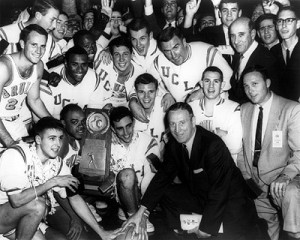Wooden You Know It: An ADHD Coach
The recent death of renowned basketball coach John Wooden at age 99 stirred up plenty of memories. As a kid growing up in Kansas City, I had the privilege of seeing Wooden’s UCLA Bruins win their first NCAA basketball championship in person in 1964. Little did I know that this undefeated squad led by the bespectacled coach with the rolled-up program in hand would not only beat favored Duke to win the title, but would go on to win 38 consecutive NCAA tournament games and 10 of the next 12 championships. For much of my youth, the only thing that seemed as certain as death and taxes was UCLA winning the NCAA tournament.

After winning his first title, John Wooden removed his glasses to celebrate with his 1964 championship team.
Wooden became an iconic figure who grew to be more beloved after he retired from coaching UCLA in 1975. His players, and he had some great ones at UCLA, spoke more glowingly of their coach, their mentor, and their teacher seemingly with each passing day. They spoke of his pyramid of success and the countless other “Woodenisms” that stuck with them long after their playing days were over. In reviewing some of those sayings as found on CoachWooden.com, I was struck by a few of his comments that seemed to relate to what I try to convey to patients who are being evaluated and then treated for ADHD. We hear more today about those who present themselves as ADHD coaches, but maybe John Wooden was unknowingly the first ADHD coach.
Coach Wooden said, “It’s not so important who starts the game, but who finishes it.” That’s true enough in basketball, but equally of concern to those who have ADHD. So often, my patients tell me how they are quite capable of starting numerous projects, but their ability to stay on task and complete the task is markedly impaired. For those who struggle to finish their assignments, the feeling is not all that different from those who are sitting on the bench watching their teammates trying to close out a game.
How about this one: “Never mistake activity for achievement.” You would have thought Coach Wooden was writing for a chapter about ADHD with this comment. For years, hyperactivity was the required predominant symptom to make the diagnosis of ADHD. Although the umbrella of symptoms has opened to include inattentive symptoms of poor focus and concentration along with being easily distracted, either way the “Woodenism” makes sense. Commonly, I ask patients if they find themselves working twice as long to get half as much done. Their activity might be extensive and lengthy, but their sense of accomplishment is often minimal. Maybe it’s not surprising that I often refer to ADHD as an “over-under” condition because the people affected feel overwhelmed and underachieving.
Several years ago when I was doing a presentation on ADHD, one attendee posed a very intriguing question. He asked if I had only one question I could ask someone to try to diagnose ADHD, what would it be? My reply, after some thought, was after finding out if there was a family history of ADHD, I would ask if the patient had ever been told during his or her academic career that he or she was not applying oneself or working up to capabilities. I am sure there are other plausible answers to the question I was asked, but my response is right in line with Coach Wooden. He remarked, “Don’t measure yourself by what you have accomplished, but by what you should have accomplished with your ability.”
People with ADHD are typically very bright and therefore really frustrated when they are not working up to their potential. This becomes a real goal of treatment as improvement in ADHD symptoms often translates to less anxiety and fewer depressive symptoms. It really is great to see the strides made by so many patients when treatment is effective. The benefits are there in the academic, occupational, and social settings. This all goes along with Coach Wooden’s philosophy that “Success comes from knowing that you did your best to become the best that you are capable of becoming.”
The “Wizard of Westwood,” as Coach Wooden was nicknamed, made his name at a school known by the four letters UCLA. He will always be remembered as one of the great coaches in any sport, but we can also remember that in some small way he could help us understand more about another four letters–ADHD.
blog comments powered by Disqus